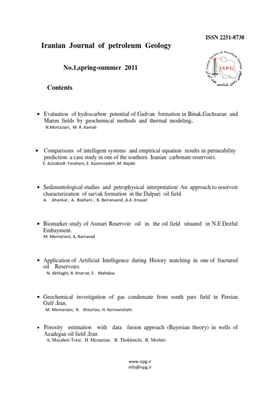Comparisons of intelligent systems and empirical equation results in permeability prediction: a case study in one of the southern Iranian carbonate reservoirs
Subject Areas :
Keywords: Carbonate reservoirs Empirical equations Fuzzy logic Neuro-Fuzzy Permeability ,
Abstract :
Prediction of permeability that is one of the most important parameters in oil and gas reservoirs is probably the most challenging issue geologists, petrophysicists, and reservoir engineers have to deal with. This parameter control fluid flow in production stage. The most reliable data of permeability are taken from laboratory analysis of cores. Since coring is a costly and time consuming operation, researchers have tried to predict this parameter from other methods. Empirical equation is one of these methods, but results of these equations are not satisfied for all lithology and reservoirs. So far, several studies have been carried out for the estimation of reservoir parameters using intelligent systems. These studies indicate the successful role of these methods such as fuzzy logic, neuro-fuzzy and genetic algorithms for reservoir characterization. In this study, we try to compare results of these two methods (empirical equations and intelligent systems) for permeability prediction in a carbonate reservoir. For this purpose, petrophysical and core data of four well in a carbonate reservoir in the Southern Iran were used. At first, using empirical equations permeability was calculated for the test well; then using data of three wells, intelligent models were constructed. A forth well (test well) from the field was used to evaluate the models. The results show that fuzzy logic result (with R2= 0.88) is the best method for prediction of permeability in the studied reservoir. Also between empirical equations, result of Wyllie-Rose equation is better than others. Finally we offer the constructed fuzzy model (as a best predictor) for permeability prediction in the studied reservoir.

